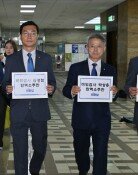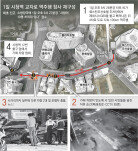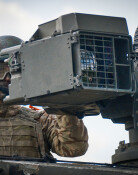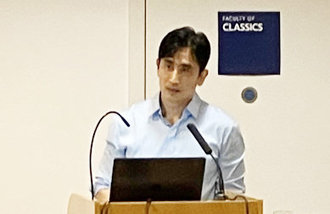Should politicians have been there at time of roaring flames?
Should politicians have been there at time of roaring flames?
Posted July. 01, 2024 07:55,
Updated July. 01, 2024 07:55
Firefighters faced a huge challenge at the scene of the fire at the lithium battery manufacturer Aricell in Hwaseong, Gyeonggi Province, which claimed a total of 23 lives last Monday. The victims were clustered on the second floor of the factory building that was engulfed in flames. The exterior walls made of styrofoam sandwich panels had collapsed, making it impossible for firefighters to enter the interior. The search was suspended for two hours and 41 minutes. The lithium-fueled fire was difficult to extinguish with water. The flames remained uncontained for a long time. It was not until 9:55 p.m. that day, nearly 12 hours after the accident, that the emergency response alert was downgraded from level 2 to level 1. Even then, the last missing person had not been found.
Politicians came to the site on the day of the accident, starting with former Land, Infrastructure, and Transport Minister Won Hee-ryong, who is running for the chairmanship of the ruling People Power Party. He arrived around 5:50 p.m., about seven hours and 20 minutes after the fire started at 10:31 a.m. "I heard that there could be many victims, so I came here without any information," he said. An hour and a half later, at around 8:50 p.m., the party’s leadership arrived, followed by the main opposition Democratic Party’s leadership 30 minutes later. At 10:40 p.m. Han Dong-hoon, former chairman of the party’s emergency committee, who is another candidate for the ruling party’s chairman, also arrived and stayed for about 30 minutes. Fire officials briefed the politicians in front of cameras, and the scene was shown to the media. Such a scene was repeated.
They may have wanted to show that politics is standing by the hurting people. Some may have been comforted. But the last missing person had still not been found at the time. When politicians come to a disaster, firefighters at the scene are mobilized to provide guidance, protocol, and briefings and even see them off on their way home. A firefighter's job is to save lives and put out fires, not to give protocol and debriefings. Of course, there are times when such actions are necessary, but they are at least not in the moment when the flames are roaring. In the age of live video conferencing and video calls, was it essential for politicians to be debriefed on the scene?
If they were a bit more prudent, they should have at least waited until after the scene was cleared and the firefighters had a chance to catch their breath. Only then they would be able to identify problems and discuss ways to improve. Even after the Sewol ferry disaster on April 16, 2014, political circles had a mood of self-reflection: "Politicians should refrain from visiting the site unless they are planning to go in with oxygen masks and perform rescue activities themselves."
At 11:52 a.m. on Tuesday, a day after the disaster when few politicians were appearing at the site, firefighters recovered the last missing body.







